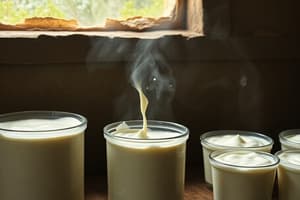Podcast
Questions and Answers
Which factor is NOT essential for the production of good yogurt?
Which factor is NOT essential for the production of good yogurt?
- Proper sanitation procedures
- Sufficient heat treatment
- Inclusion of artificial flavors (correct)
- High quality raw milk
What primary role does S. thermophilus serve during yogurt production?
What primary role does S. thermophilus serve during yogurt production?
- It produces lactic acid to firm the texture.
- It increases the fat content of yogurt.
- It gives yogurt its characteristic color.
- It generates acidity to foster *L. bulgaricus* growth. (correct)
Which characteristic does NOT define good yogurt?
Which characteristic does NOT define good yogurt?
- Acceptable aroma and flavor
- Uniform color appearance
- Homogeneous texture without gaps
- Presence of whey on the surface (correct)
What defect would result from weak coagulation during yogurt making?
What defect would result from weak coagulation during yogurt making?
Which compound is primarily responsible for the flavor and taste in yogurt produced by L. bulgaricus?
Which compound is primarily responsible for the flavor and taste in yogurt produced by L. bulgaricus?
What is the primary function of starter cultures in the fermentation of dairy products?
What is the primary function of starter cultures in the fermentation of dairy products?
Which of the following is NOT a characteristic of rareb milk?
Which of the following is NOT a characteristic of rareb milk?
How does heating milk to 90-95°C contribute to the fermentation process?
How does heating milk to 90-95°C contribute to the fermentation process?
Which of the following best describes the typical composition of yogurt?
Which of the following best describes the typical composition of yogurt?
What role does acidity play in the preservation of fermented dairy products?
What role does acidity play in the preservation of fermented dairy products?
What is a major flavor compound produced during the fermentation of dairy products?
What is a major flavor compound produced during the fermentation of dairy products?
Which statement about the fermentation process of dairy is incorrect?
Which statement about the fermentation process of dairy is incorrect?
In what manner does the technological basis of fermented dairy products affect their shelf life?
In what manner does the technological basis of fermented dairy products affect their shelf life?
Flashcards are hidden until you start studying
Study Notes
Fermented Dairy Products
- Fermented dairy products are made from whole milk, skimmed milk, or a mixture of both using specific starter cultures.
- These cultures must be alive until the product reaches the consumer and contain no harmful bacteria.
Technological Basis for Fermented Dairy Products
- Starter cultures are added to milk, causing fermentation.
- This process reduces lactose concentration, produces lactic acid for texture, and creates a distinctive flavor.
- Common starter cultures include lactic acid bacteria, bacteria, yeasts, or molds.
Preservation
- Milk is heated to 90-95°C for 10-15 minutes to eliminate most microorganisms.
- Acidity produced during fermentation also contributes to preservation.
Types of Egyptian Fermented Dairy Products
- Yogurt (or Yoghurt): Fermented with specific lactic acid bacteria strains, may contain fruit but typically does not contain salt.
- Rareb Milk: Raw milk left to curdle in earthenware pots, common in rural Egypt. Cream layer is removed.
Requirements for Good Fermented Dairy Products
- High-quality raw milk.
- Sufficient heat treatment.
- Active starter culture.
- Rapid cooling after production.
- Careful production processes.
- Sanitation and sterilization procedures.
- Milk free from antibiotics.
Yogurt Production
- Yogurt must meet specific quality requirements to be considered good.
Function of S. thermophilus in Yogurt Production
- Creates conditions for L. bulgaricus growth.
- Contributes to flavor and texture.
Function of L. bulgaricus in Yogurt Production
- Produces lactic acid for firm texture.
- Creates main flavor components, notably acetaldehyde.
Characteristics of Good Yogurt
- Firm, homogeneous texture without holes.
- Smooth and not grainy.
- No whey on the surface or sides.
- Uniform, acceptable color.
- Acceptable fat content, flavor, and aroma; not excessively acidic.
- Packaged in acceptable containers with a lid preventing contamination.
Yogurt Defects
- Weak or slow coagulation.
- Insufficient flavor.
- Whey formation.
- Sour or bitter taste.
- Burnt or cooked taste.
Studying That Suits You
Use AI to generate personalized quizzes and flashcards to suit your learning preferences.




